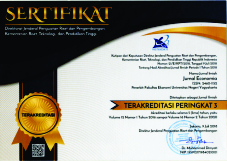The Effect of Consumption Values to Repurchase Intention of Green Products
Downloads
Abstract: The Effect of Consumption Values to Repurchase Intention of Green Products. This study was aimed to apply the theory of consumption values to determine the factors affecting the behavior of consumers regarding the selection of green products, and examine the influence of consumption values such as the functional value, social value, emotional value, conditional value, and epistemic value to repurchase intention of green products. The population of this research is green product customers in Surakarta city. This research selected 100 respondents purposively. Based on the data showed that the consumption values that consist of functional value, social value, emotional value, conditional value and epistemic value had a positive effect on repurchase intention of green products.
Keywords: Green product, consumption values, consumer behavior, repurchase intention.
Abstrak: Efek Nilai Konsumsi terhadap Niat Pembelian Kembali pada Green Product. Tujuan dari penelitian ini adalah untuk menerapkan teori nilai konsumsi untuk menentukan faktor-faktor yang mempengaruhi perilaku pilihan konsumen mengenai produk ramah lingkungan, dan meneliti pengaruh nilai-nilai konsumsi seperti nilai fungsional, nilai sosial, nilai emosional, nilai kondisional, dan nilai epistemis terhadap niat membeli kembali produk ramah lingkungan. Populasi penelitian ini adalah konsumen yang menggunakan produk ramah lingkungan yang ada di kota Surakarta. Penelitian ini mengambil sampel sebanyak 100 responden secara purposive. Analisis data menggunakan analisis regresi berganda. Berdasarkan data dapat diketahui bahwa nilai konsumsi yang terdiri dari nilai fungsional, nilai sosial, nilai emosional, nilai kondisional dan nilai epistemik terbukti berpengaruh positif terhadap niat pembelian kembali pada produk ramah lingkungan.
Kata kunci: Produk ramah lingkungan, nilai konsumsi, sikap konsumen, niat pembelian kembali.
Downloads
Anderson, R. E. and Srinivasan, S. S. 2003. E-Satisfaction and E-loyalty: A Contigency Framework, Journal of Psychology and Marketing, Vol 20, February 2003, pp. 123-138.
Andrila, Biswas. And Mousumi, Roy. 2015. Green products: an exploratory study on the consumer behaviour in emerging economies of the East, Journal of Cleaner Production, Deptember 2014.
Assael, H. 2004. Consumer Behavior: A Strategic Approach. USA: Houghton Mifflin Company
Bei, L., Simpson, E., 1995. The determinants of consumers' purchase decisions for recycled products: an application of acquisition-transaction utility theory.Advances in Consumer Research 22 (1), 257e261.
Bryman, A. & Bell, E. (2011). Business research methods. (3 ed). Oxford: Oxford University Press.
Chen, T.B. dan Chai, L.T, (2010). Attitude towards the environment and green products. Management Science and Engineering. 4(2), 27-39.
Chen, YS, Chang CH. Enhance green purchase intentions: the roles of green perceived value, green perceived risk, and green trust. Manag Dec 2012;50(3):502-20.
Chen, Y. & Chang, C. (2013). Greenwash and Green Trust: The Mediation Effects of Green Consumer Confusion and Green Perceived Risk. Journal of Business Ethics, 114 (3), 489-500.
D'Souza, C., Taghian, M., Peretiatko, R., 2007. Green decisions: demographics and consumer understanding of environmental labels. International Journal of Consumer Studies 31 (4), 371e376.
Ghauri, P. & Grí¸nhaug, K. (2010). Research Methods in Business Studies. (4 ed). Harlow: Pearson Education.
Haytko DL, Matulich E. Green advertising and environmentally responsible consumer behaviours: Linkages examined. J Manag Mark Res 2008;7(1):2-11.
Hicks, J.M., T.J. Page, Jr., B.K. Behe, J.H. Dennis, and R.T. Fernandez. 2005. Delighted Consumers Buy Again, Journal of Consumer Satisfaction, Dissatisfaction and Complaining Behavior, Vol. 18, pp. 94–104.
Killbourne, W., Picket, G., 2008. How materialism affects environmental belief, concern and environmentally responsible behavior. J. Bus. Res, 61, 885-893
Laroche M, Bergeron J, Barbaro-Forleo G. Targeting consumers who are willing to pay more for environmentally friendly products. J Consum Mark 2001;18(6): 503-20.
Lee, J., J. Lee, and L. Feick. 2001. The Impact of Switching Costs on The Customer Satisfaction-Loyalty Link: Mobile Phone Service in France, Journal of Services Marketing, Vol. 15, Iss: 1, pp. 35-48.
Malhotra, N.K. (2010). Marketin research: An applied orientation. New Jersey; Pearson Education.
Norazah, Mohd Suki. And Norbayah, Mohd Suki. 2015. Consumer Environmental Concern and Green Product Purchase in Malaysia: Structural Effects of Consumption Values, Journal of Cleaner Production.
Rettie, R., Burchell, K. & Riley, D. (2012). Normalising green behaviours: A new approach to sustainability marketing. Journal of Marketing Management, 28 (3-4), 420-444.
Shamsadhani, P., Chon-Lin, G. dan Richmond, D. (1993). Exploring green consumers in an oriental culture: Role of personal and marketing mix. Advances in consumer research, 20, 488-493.
Wang, P., Qian, L., Yu, Qi., 2013.Factors Influencing sustainable consumption behaviors; a study of rural residences in China, J. Clean Production.
Wells, V.K., Ponting, C.A. & Peattie, K. (2011). Behaviour and climate change: Consumer perceptions of responsibility. Journal of Marketing Management, 27 (7-8), 808-833.















